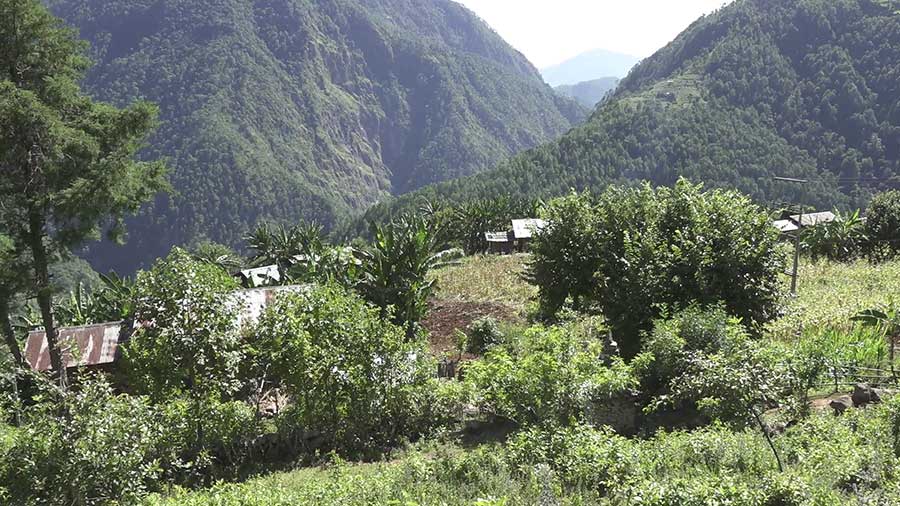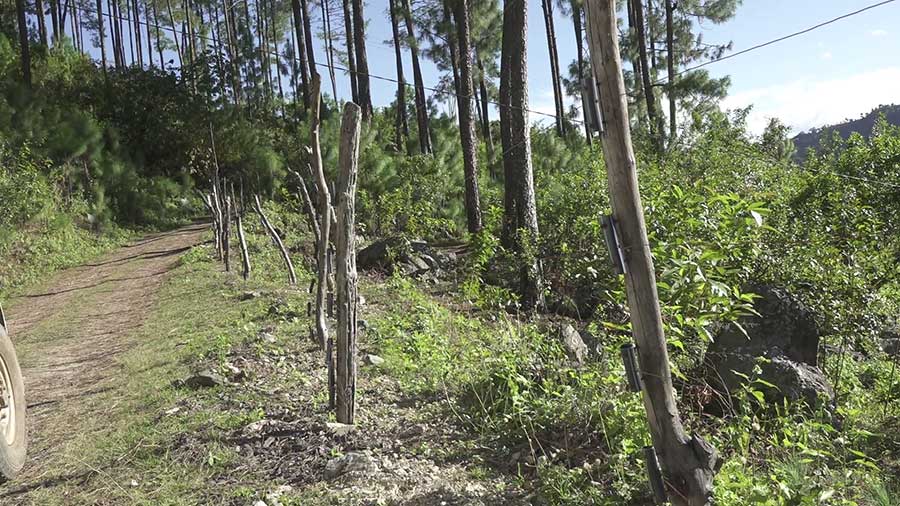
Farmers in Ngaru_Pongtang chiwog in Thangrong Gewog of Monggar are reaping the benefits of climate-smart agriculture. The Agriculture Research and Development Center in Monggar has been initiating this unique farming practice in the eastern districts to overcome the impact of climate change on agriculture. Besides improving the livelihoods of farmers, the practice is expected to enhance the country’s food security.
The climate-smart agriculture focuses on adapting strategies for sustainable agriculture development. Started in 2016, the climate-smart village approach is implemented in those villages which were hit hard by climate change to increase agriculture productivity and enhance income.
In Ngaru_Pongtang chiwog, about 50 families are the beneficiaries of this project. They were provided with dryland irrigation, electric fencing and fruit saplings and seeds to enhance multiple cropping of fruits integrated with dairy farming.
 “In the earlier days, the fruit trees used to die due to water scarcity but with the intervention from the CARLEP project, the fruit trees are surviving now with irrigation water made available. We had to guard our crops against wild animals all the time in the past. But today electric fencing does all the work,” said Karma Yangki, a Farmer in Ngaru_Pongtang.
“In the earlier days, the fruit trees used to die due to water scarcity but with the intervention from the CARLEP project, the fruit trees are surviving now with irrigation water made available. We had to guard our crops against wild animals all the time in the past. But today electric fencing does all the work,” said Karma Yangki, a Farmer in Ngaru_Pongtang.
“With the increase in the number of households, the irrigation water was not sufficient for all the houses. And due to the increase in the temperature recently, the fruit trees and the vegetables that used to grow in the earlier years do not survive,” said Lhendup, the Tshogpa of Ngaru_Pongtang chiwog.
 He says the residents have to manage vegetables from here and there for their own consumption in the past. But “since 2016, the CARLEP project has supported us with electric fencing and it has helped us a lot. After that, the project also supported us with irrigation water. Without sufficient irrigation water, growing mass vegetables used to be a major challenge.”
He says the residents have to manage vegetables from here and there for their own consumption in the past. But “since 2016, the CARLEP project has supported us with electric fencing and it has helped us a lot. After that, the project also supported us with irrigation water. Without sufficient irrigation water, growing mass vegetables used to be a major challenge.”
“We did not grow vegetables in mass in the past due to water scarcity. But with support from the CARLEP Project including irrigation water, we now venture into mass vegetable production and orchard management. We also started earning some income by selling mango in the market,” added Sonam, also a farmer from the same village.
According to agriculture officials, drought, human-wildlife conflict, insufficient irrigation water and poor access to the market were some of the major challenges faced by the farmers of Ngar_Pongtang chiwog. However, these are all stories of the past. The climate-smart approach has enabled the farmers to do better. They are also contributing to reducing greenhouse gas emissions by adopting biogas technology.
“Thangrong Gewog is one of the gewogs hit hard by climate change. Ngaru_Pongtang chiwog suffered acute water shortage and without enough water, farmers cannot practice successful commercial farming. When farmers cannot engage in such farming, it affects their livelihoods,” said Lhap Dorji, the Program Director of the ARDC in Monggar.
To address the market accessibility problem, Ngar-Pongtong is now market linked with Bhutan Agro Industries Limited in Monggar through contractual farming to sell their fruits.
So far, the ARDC in Monggar has identified a dozen of villages in the six eastern districts to implement climate-resilient farming practices.
“We have identified 12 villages as a part of climate-smart village. By next year, we will be able to finish our project in 320 households that will cover 300 acres in all 12 villages. We have identified those villages based on the prevalence of poverty rate in the country,” the Program Director added.
About Nu 5 M was spent on implementing climate-smart agriculture in the eastern districts with financial assistance from the Commercial Agriculture and Resilient Livelihoods Enhancement Program/ CARLEP.
Sonam Tshering, Monggar
Edited by Sonam










